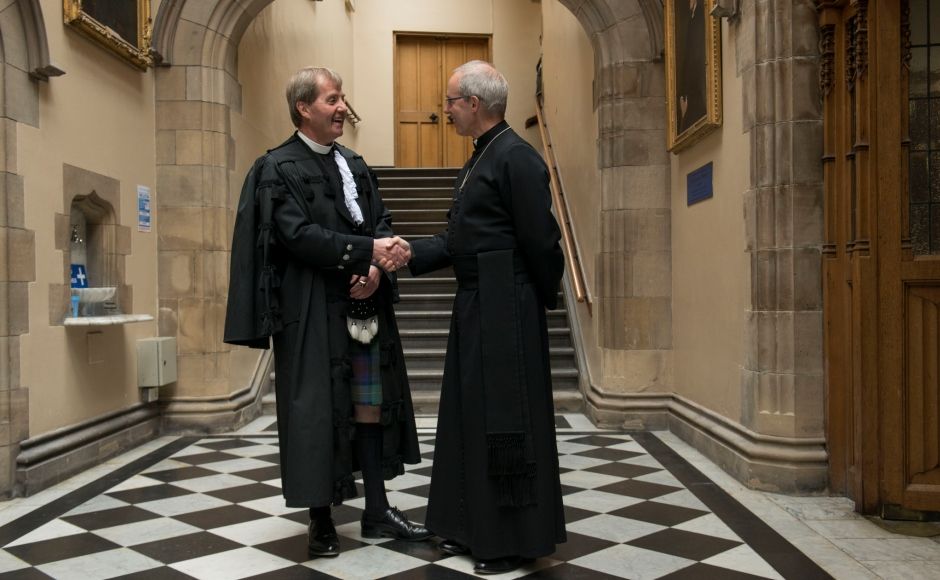News outlets are announcing the decision between the Church of England and the Church of Scotland to agree to the Columba Declaration, expanding and solidifying the relationship between the two churches, and responses are mixed. Thinking Anglicans includes a good round-up of links and past coverage on its site. Archbishop Justin Welby participated in debate in the General Assembly in Edinburgh.
From the Church of Scotland’s announcement:
Under the terms of the agreement,both denominations would welcome one another’s members into congregations and ordained ministers would be allowed to exercise ministry within the existing discipline of each church, though only within England and continental Europe.
Speaking after the vote, The Rev Alison McDonald, Convener of the Church of Scotland’s Ecumenical Relations Committee, said: “I am delighted that the General Assembly has accepted the report and the Columba Declaration this morning.
“It is the end of what has been a very long process up to now, but it is the beginning of looking forward to new work examining how we will implement the Columba Declaration.”
An earlier Anglican Ink report includes the full text of the Declaration, which includes:
We commit ourselves to grow together in communion and to strengthen our partnership in mission. Through this commitment, we hope to enrich our continuing relationships with other churches in the United Kingdom and around the world. We will welcome opportunities to draw other churches into the activities and initiatives that we share.
As part of that commitment, we will continue to:
(i) pray for and with one another;
(ii) welcome one another’s members to each other’s worship as guests and receive one another’s members into the congregational life of each other’s churches where that is their desire;
(iii) explore opportunities for congregational partnership, formal as well as informal, in those cases where there are churches in close geographical proximity;
(iv) enable ordained ministers from one of our churches to exercise ministry in the other church, in accordance with the discipline of each church;
(vi) identify theological issues that arise from growth towards fuller communion and be prepared to allocate resources to addressing them;
(vii) work together on social, political and ethical issues that arise from our participation in public life and be prepared to allocate resources to joint initiatives for addressing them.
The Scottish Episcopal Church, which has long been in relationship with the Church of Scotland, will be represented in a Contact Group to be formed as the partnership moves forward, and while the official statement on the SEC’s site, from the Primus of the Scottish Episcopal Church, the Most Rev David Chillingworth, is cordial:
“We are grateful to the General Assembly for extending an invitation to the Scottish Episcopal Church to appoint a member to the contact group being created to take forward this agreement between the Church of Scotland and Church of England. That will give us the opportunity to be actively involved in future developments. Our representative at the Assembly this year, the Rt Rev Mark Strange, Bishop of Moray, Ross and Caithness, was able to express our common desire to move forward in furtherance of the Gospel of Christ and expressed our thanks for the gracious apology given by the Archbishop of Canterbury during his address to the Assembly.”
The SEC has voiced concerns. From the Church Times, in January, just after the Declaration was first announced (though not agreed upon):
THE Scottish Episcopal Church (SEC) is “deeply hurt” by a new agreement between the Church of England and the Church of Scotland, the Primus, the Most Revd David Chillingworth, said in a series of blogs last week.
The Columba Declaration — named after the fifth-century Irish missionary St Columba who is said to have introduced Christianity to Scotland — was announced on Christmas Eve. It is the fruit of a joint study group led by the Bishop of Chester, Dr Peter Forster, and Dr John McPake, a minister in the Church of Scotland.
The agreement commits the two national Churches to “grow together in communion and to strengthen our partnership in mission”.
Bishop Chillingworth said that the Declaration would cause “real difficulty” in the relationship between his Church and the C of E.
Would English Anglicans who visited Scotland now be assumed to worship in Church of Scotland parishes rather than the SEC, he asked. He was surprised that the Church of Scotland seemed to be focusing its efforts on reaching across the border rather than strengthening relations with other Scottish Churches.
He also questioned whether it was “proper” for the C of E to enter an agreement about “ministry and ecclesiastical order” in a country where it had no jurisdiction. “The Anglican way is to recognise the territorial integrity of each province — they are autonomous, but inter-dependent,” he wrote.
And there are theological differences as well. From the BBC:
Speaking ahead of the agreement – known as the Columba Declaration – being unanimously approved by the general assembly, Archbishop Welby said the two churches were already united historically, politically and economically.
He wants to see the churches work more closely even though differences over same-sex marriage remain.
The General Assembly of the Church of Scotland voted to allow its ministers to be in same-sex marriages on the first day of the 2016 General Assembly.
Photo from the Church of Scotland. Caption: “Moderator of the General Assembly the Right Rev Dr Russell Barr shakes hands with Archbishop of Canterbury the Most Rev Justin Welby.”

